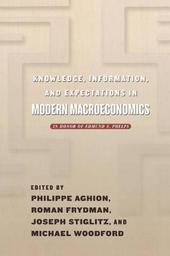
|
Knowledge, Information, and Expectations in Modern Macroeconomics: In Honor of Edmund S. Phelps
Paperback / softback
Main Details
| Title |
Knowledge, Information, and Expectations in Modern Macroeconomics: In Honor of Edmund S. Phelps
|
| Authors and Contributors |
Edited by Philippe Aghion
|
|
Edited by Roman Frydman
|
|
Edited by Joseph E. Stiglitz
|
|
Edited by Michael Woodford
|
| Physical Properties |
| Format:Paperback / softback | | Pages:592 | | Dimensions(mm): Height 235,Width 152 |
|
| Category/Genre | Macroeconomics |
|---|
| ISBN/Barcode |
9780691094854
|
| Classifications | Dewey:339 |
|---|
| Audience | | Professional & Vocational | | Tertiary Education (US: College) | |
|---|
| Illustrations |
227 line illus. 21 tables.
|
|
Publishing Details |
| Publisher |
Princeton University Press
|
| Imprint |
Princeton University Press
|
| Publication Date |
26 January 2003 |
| Publication Country |
United States
|
Description
Macroeconomics would not be what it is today without Edmund Phelps. This book assembles the field's leading figures to highlight the continuing influence of his ideas from the past four decades. Addressing the most important current debates in macroeconomic theory, it focuses on the rates at which new technologies arise and information about markets is dispersed, information imperfections, and the heterogeneity of beliefs as determinants of an economy's performance. The contributions, which represent a breadth of contemporary theoretical approaches, cover topics including the real effects of monetary disturbances, difficulties in expectations formation, structural factors in unemployment, and sources of technical progress. Based on an October 2001 conference honoring Phelps, this incomparable volume provides the most comprehensive and authoritative account in years of the present state of macroeconomics while also pointing to its future. The fifteen chapters are by the editors and by Daron Acemoglu, Jess Benhabib, Guillermo A. Calvo, Oya Celasun, Michael D. Goldberg, Bruce Greenwald, James J. Heckman, Bart Hobijn, Peter Howitt, Hehui Jin, Charles I. Jones, Michael Kumhof, Mordecai Kurz, David Laibson, Lars Ljungqvist, N. Gregory Mankiw, Dale T. Mortensen, Maurizio Motolese, Stephen Nickell, Luca Nunziata, Wolfgang Ochel, Christopher A. Pissarides, Glenda Quintini, Ricardo Reis, Andrea Repetto, Thomas J. Sargent, Jeremy Tobacman, and Gianluca Violante. Commenting are Olivier J. Blanchard, Jean-Paul Fitoussi, Mark Gertler, Robert E. Hall, Robert E. Lucas, Jr., David H. Papell, Robert A. Pollak, Robert M. Solow, Nancy L. Stokey, and Lars E. O. Svensson. Also included are reflections by Phelps, a preface by Paul A. Samuelson, and the editors' introduction.
Author Biography
Philippe Aghion is Professor of Economics at Harvard University and at University College London. Roman Frydman is Professor of Economics at New York University. Joseph Stiglitz, Professor of Economics at Columbia University, was awarded the Nobel Prize in Economic Science in 2001. Michael Woodford is the Harold H. Helm '20 Professor of Economics and Banking at Princeton University.
Reviews"This is a terrific book, about as good as volumes of collected papers will ever get. It will attract considerable interest, because it brings together so many of our most illustrious people in macroeconomics to reconsider the concepts of one of our most influential theorists, Ned Phelps."-Robert J. Shiller, Yale University, author of Irrational Exuberance "This is an outstanding volume full of important contributions by major figures in each of the fields in which Phelps has contributed. It would be worth publishing just for the excellent introduction! Indeed, it would also be worth publishing just for the extremely valuable comments. But the papers themselves are excellent. They will be read and reread by successive generations of economists who understand Phelps's critical role in the development of modern economics."-Laurence J. Kotlikoff, Boston University "This volume makes it clear that Edmund 'Ned' Phelps did not simply contribute to modern macroeconomics but in many ways he defined it; and that his work is remarkable for its breadth and for its vitality as a source of new ideas. The papers included here, each of which examines and develops a theme originally raised by Phelps, are at the very frontier of current macroeconomic research. Consistent with this breadth and vitality, this book will find a wide audience."-Dominick Salvatore, Fordham University "Many of the outstanding papers in this volume explore genuinely new ideas. The book addresses a large number of the hottest current macroeconomic policy issues and related theoretical problems."-Duncan K. Foley, Graduate Faculty, New School University
|